| Back One Page | Home | Forward One Page |
| The Bureau of Military History and the Witness Statements | |
|
The Bureau of Military History was established by the Minister for Defence and former Officer Commanding Dublin Brigade IRA, Mr. Oscar Traynor, T.D. on 1 January 1947.The objective being ‘to assemble and co-ordinate material to form the basis for the compilation of the history of the movement for Independence from the formation of the Irish Volunteers on 25 November 1913 to the [signing of the Truce] 11 July 1921. Although the Bureau began its work in 1947, the origins go back to 1944 when Major Florence O’Donoghue, editor of An Cosantóir, suggested that a series of articles on Irish military leaders be published in the journal. This series of articles can be found in An Cosantóir 1945-1946. Following this a plan was drafted by Major O’Donoghue which was approved by An Taoiseach, Eamon de Valera, T.D. Subsequent to final approval by the Department of Finance the Bureau of Military History came into being. Over the following ten years 1773 witness statements (WS), 334 groups of contemporary documents (CD), 42 photographs (P), 12 voice recordings (VR) and a selection of press cuttings (PC) were assembled by the Bureau from a variety of individuals who had been active in the period 1913 - 1921. Some well known contributors to the Bureau, however, the majority of contributors to the Bureau were the ordinary men and women involved in the movement for Independence. The collection covers events such as the Howth Gun-running, 1914; the Easter Rising, 1916; the formation of the first Dáil, 1919 and the outbreak of the War of Independence, 1919. The Bureau staff included senior army personnel and civilians. Each investigating officer was given intensive training in interview skills and provided with a code of instruction and a chronology of events of the period in order to assist in obtaining a thorough and accurate account of the witnesses’ experience. Their job was to travel throughout the country to gather as much evidence as possible from those involved in the Independence movement. Much of the information was gathered from members of the Irish Volunteers and later the IRA, but other groups including Fianna Éireann, Cumann na mBan, the Irish Republican Brotherhood, the Irish Citizen Army, and Clann na Gael are also represented. Assisting the Bureau staff was an Advisory Committee appointed by the Minister for Defence, chaired by Richard Hayes and including Robert Dudley Edwards, G. A. Hayes McCoy and Theodore W Moody. This committee was comprised of academics and other scholars of Irish history. Its purpose was to offer guidance, oversee progress and deal with general queries which inevitably arose in the course of the work. The immediate problem facing the Bureau was the fact that the principal leaders of the 1916 Rising had been executed and a good number of Volunteers had died before the establishment of the Bureau. It was therefore decided to focus on surviving officers of Divisions, Brigades, Battalions and Companies which had seen active service. In order to achieve this an information leaflet was compiled and circulated, the Minister for Defence made a radio appeal and notices appeared in the national press. This campaign proved to be highly successful in attracting witnesses including many civilians who wished to place on record how they were affected during the Rising and the War of Independence. Witness Statements Detailed instructions were issued to investigating officers, which covered issues such as the taking of evidence, the disclosure of information, communication to the press, accuracy and literary style of witness statements. Gaining an accurate, factual account from the contributors was of paramount importance to the staff of the Bureau. ‘In listening to and recording his story you should keep an open mind. Your aim at all times must be to get from him an objective ,factual record of events based on his own experiences. To that end he should be tactfully questioned on every point, to ensure that what he tells is, in fact, what he knows and not something which he has imagined, read or heard from someone else’ (File S. 851. 10 May 1948) The Director of the Bureau was aware that personal testimony is subjective and the ability of witnesses to give an accurate account could change over time. Investigating officers were encouraged to gain as true a picture as possible given the circumstances of collecting information after such a long lapse between events. ‘Failing memory will sometimes impart an air of unreliability to what may be a genuine story, and the utmost care must be exercised in such cases... a witness must, under no circumstances, be persuaded to agree to anything which does not accord with his own personal recollection. There must be no attempt to smooth out or adjust a story, in order to make it more plausible or readable.’ In compiling the evidence from the period the Bureau divided its work into three phases; the formation of the Irish Volunteers and associated organisations, events that led up to the Rising and the Rising itself and finally focused on the events of the period 1917 - 1921. © Military Archives, 2002 |
|
| The Military Archives, Cathal Brugha Barracks, Rathmines, Dublin 6, has custody of the 1,770 witness statements, 66 annexes to witness statements, 54 collections of documents relating to people who did not contribute statements, 322 collections of original documents, 178 collections of press cuttings, 12 voice recordings, and 246 photographs | |
| The names of all 1770 statement makers are included in my reference page here | |
| The witness would have been given a copy of his statement to keep. Below is an example of a private copy of a witness statement. | |
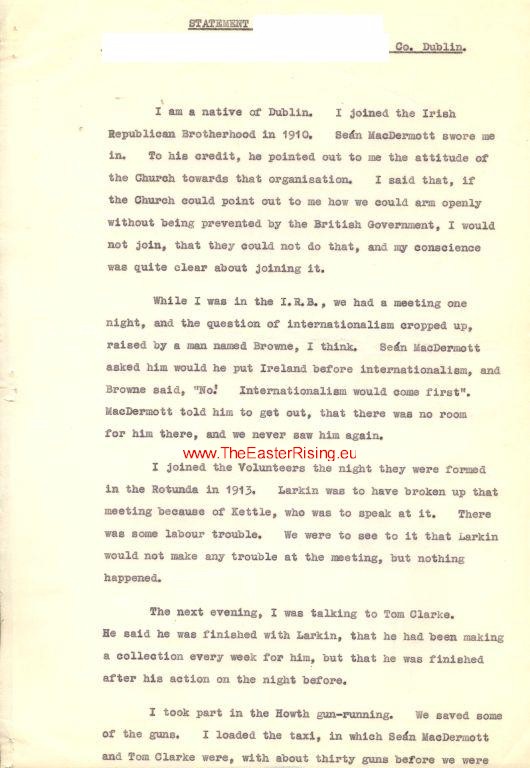 |
|
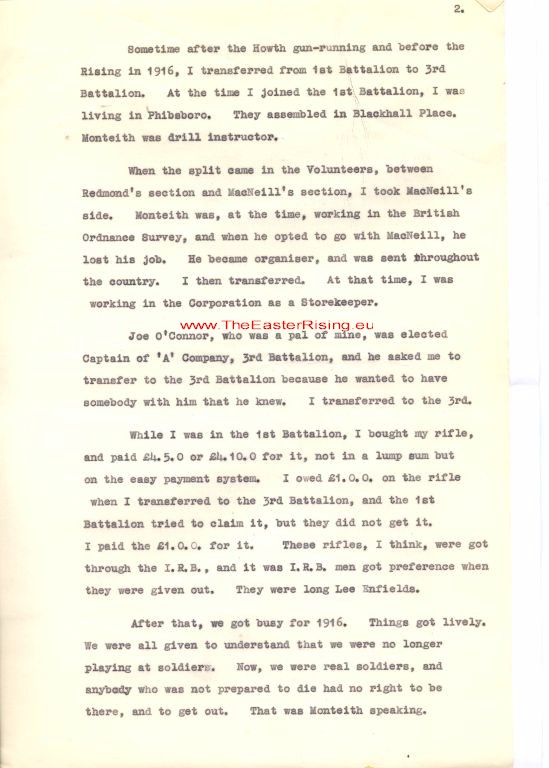 |
|
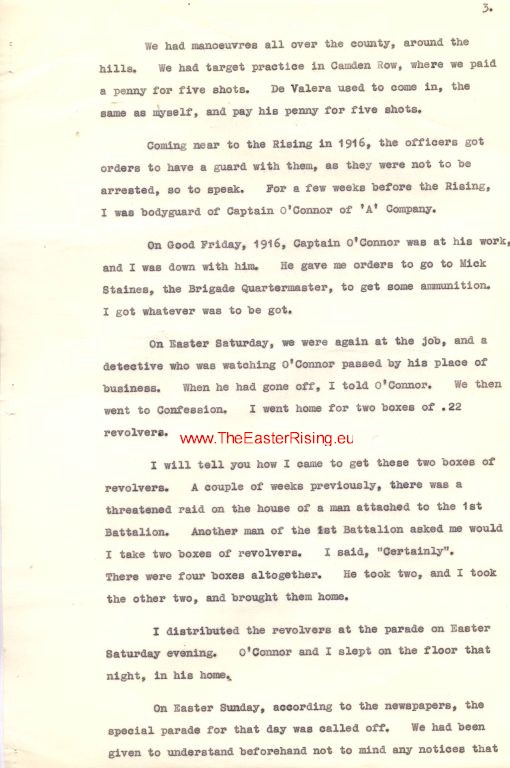   |
|
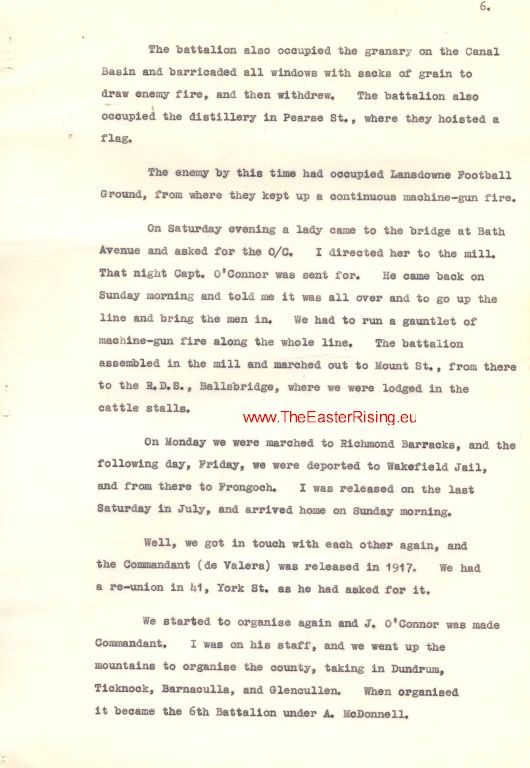 |
|
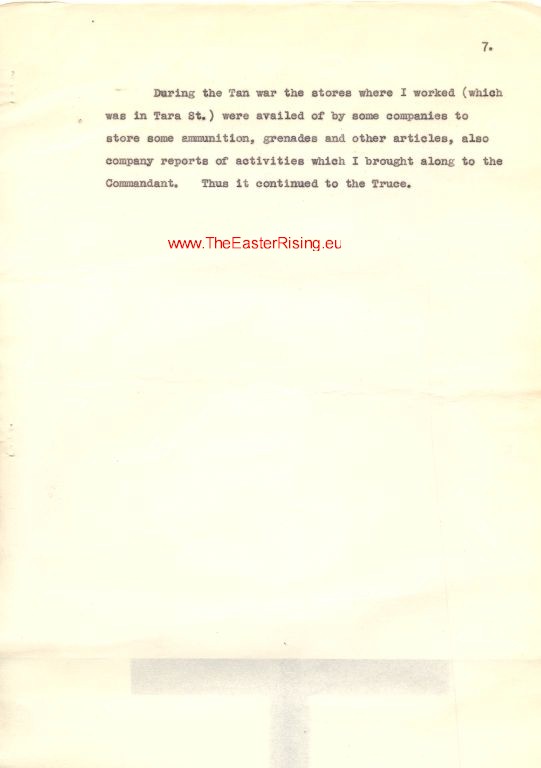 |
|
| Below are two school project pages made by this rebel's grand-daughter with a signed copy of Eamon De Valera's postcard and a newspaper cutting showing her Grandfather (cross on hat) under arrest. This lady has since found this site and is delighted I am sharing the story of her grandfather, on the web, whom she is very proud of. | |
 |
 |
| Back One Page | Home | Forward One Page |
